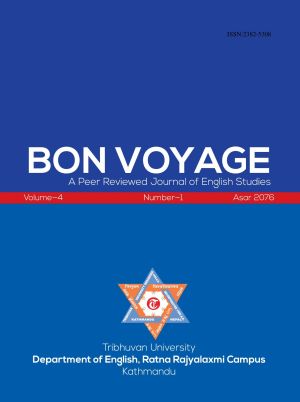Celebration of Meaninglessness in Kurt Vonnegut’s Slaughterhouse Five
DOI:
https://doi.org/10.3126/bovo.v4i1.54190Keywords:
celebration, meaninglessness, postmodernism, parody, pastiche, irony, intertextualityAbstract
This is an exploratory inquiry on Slaughterhouse-Five of Kurt Vonnegut. The inquiry uses insights from the postmodernist art to investigate how the novel celebrates the meaninglessness employing various techniques and how the protagonist Billy Pilgrim comes to terms with his meaningless existence. It was found that the novel uses the postmodernist novelistic technic and theme such as the use of the subversion of narration, pastiche, parody, intertextuality, adaptation, alienation, paradox, fragmented character and narrative structure as the devices for diminishing painful experiences of Second World War.




